

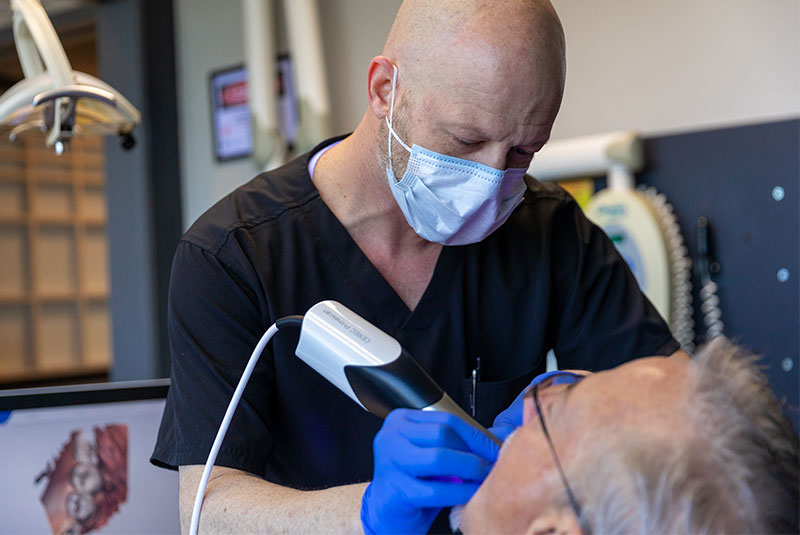
Are you looking for an oral surgeon with a wide array of skills and years of experience? At DFW Implant Center, our dedicated team offers a comprehensive array of specialized dental treatments to boost and preserve your oral health. Led by distinguished Arlington, TX, board-certified periodontist, Dr. Farhad E. Boltchi, we deliver cutting-edge care for both treatable dental conditions and facial conditions.
Whether you require treatment for infections, tooth replacements, or other oral health conditions, DFW Implant Center is here to help. Learn more by dialing 817-663-4704 if you’re a new patient or 817-467-7731 if you’re a current patient.
Impacted teeth are teeth blocked from breaking through the gum for various reasons. This condition can lead to serious oral health problems such as red, swollen, or bleeding gums, bad breath, difficulty opening the mouth, and pain when chewing or biting.
Impacted teeth are often discovered during routine dental X-rays and may not always cause noticeable symptoms. While impacted teeth don’t always require treatment, they can lead to oral health complications like infections or damage to other teeth in some cases. The most commonly impacted teeth are wisdom teeth, which typically emerge between the ages of 17 and 21.
In cases where impacted teeth, especially wisdom teeth, are causing issues or oral health problems like infections, damage to other teeth, or complications, tooth removal may be necessary. This procedure involves surgically extracting the impacted tooth to prevent further dental health problems. During a surgical extraction, Dr. Boltchi will make a small incision into the gum tissue to expose every part of the tooth and the tooth may be broken into parts for easier removal.
Orthodontic treatments can be beneficial for mild cases of impacted teeth. These treatments aim to bring the impacted tooth to its correct position using braces or brackets.
Braces or brackets can also be used as eruption aids. These aids are most effective when applied at a younger age. If the impacted tooth cannot erupt successfully, it may need to be removed and replaced with a dental implant or dental bridge.
Early detection through regular dental checkups is crucial in managing impacted teeth effectively. Proper monitoring allows Dr. Boltchi to compile a thorough oral health surveillance report, which can help him stop the development of largely preventable oral health problems in the early stages, and ensure optimal oral health.
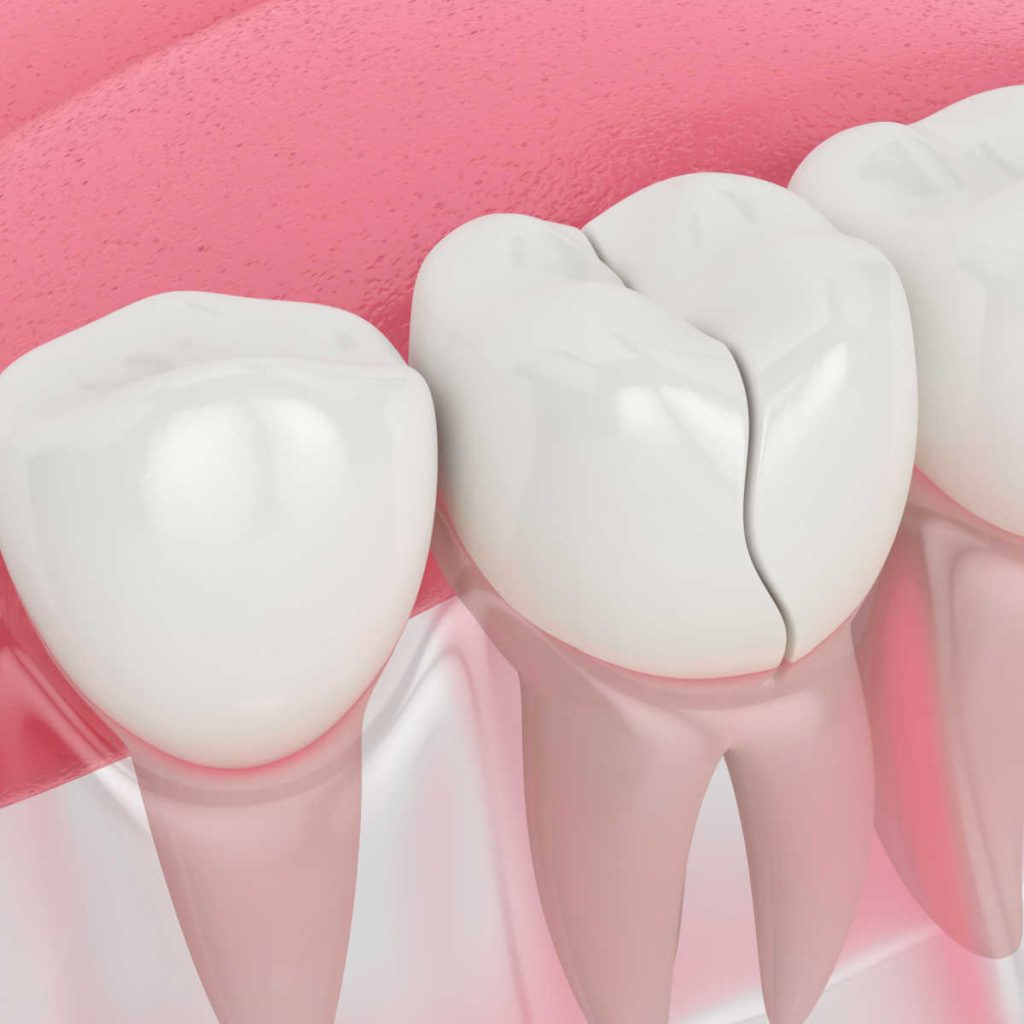
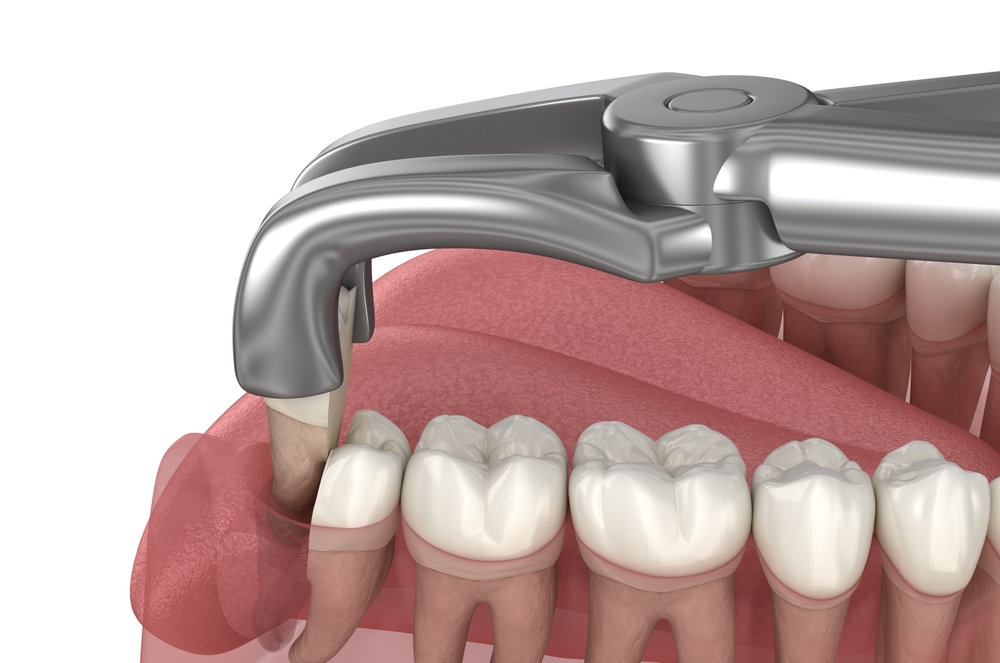
Broken and infected teeth are other common conditions we treat at DFW Implant Center. Common causes of a broken tooth can vary, from sudden impacts to biting down on hard objects to chronic conditions such as grinding teeth (bruxism).
Additionally, large fillings that weaken the tooth’s structure and abrupt changes in temperature in the mouth can also contribute to tooth fractures. People with a history of tooth decay or root canal treatments may also be more prone to experiencing a cracked tooth.
A tooth infection, also known as a tooth abscess, is a condition characterized by a pocket of pus resulting from a bacterial infection within the gums. This infection typically arises due to tooth decay, trauma to the tooth, or other forms of damage that allow bacteria to penetrate the tooth’s center (the dental pulp).
The infection can spread from the root of the tooth to the surrounding bone and tissues, leading to symptoms like severe and continuous toothache, gum swelling over the infected tooth, fever, and general discomfort.
Repairing cracked or broken teeth with dental bonding or fillings is common practice. Dental crowns can cover and protect teeth with larger cracks and breaks, fully restoring the natural tooth. For more severe cases where the dental pulp is damaged, root canal therapy may be necessary to remove infected tissue and protect the tooth from further damage.
Antibiotics and pain relief medications are typically prescribed by a dental professional to treat tooth infections. These medications help kill bacteria causing the infection and alleviate pain associated with abscessed teeth. Home remedies like saltwater rinses and cold compresses can also help temporarily relieve discomfort but shouldn’t replace professional dental treatment for tooth infections.
In cases where the damage to the tooth is too extensive or severe and cannot be saved through repair methods like root canal therapy or crowns, tooth extraction may be required. Tooth extractions are performed after a thorough evaluation by Dr. Boltchi to determine the best course of action for preserving oral health and preventing further serious oral problems, infections, and complications.
Missing teeth, or partial edentulism, is one of the most common dental problems in the country. According to the American College of Prosthodontists, an estimated 178 million Americans are missing at least one tooth.
Losing teeth not only affects your ability to eat, speak, and smile with ease but also carries broader implications. Teeth provide mutual support to one another, and when one is missing, neighboring teeth may shift, potentially necessitating orthodontic intervention down the line. Additionally, the absence of tooth roots can trigger jawbone recession, which increases the other risk factors of further tooth loss and contributes to a sunken and prematurely aged facial appearance.
Dental implants, hailed as the current “gold standard” for replacing missing teeth, offer a comprehensive solution to avoid these issues altogether. Renowned for their authenticity and durability, dental implants enable you to maintain normal eating habits, speak and smile confidently, and enhance your self-esteem.
Even if you’ve experienced tooth loss due to extraction or trauma, opting for dental implants ensures a seamless transition to restoring your dental function and appearance. In cases of bone loss, our team of experienced periodontists in Arlington can reverse the damage through advanced bone grafting techniques before implant placement.
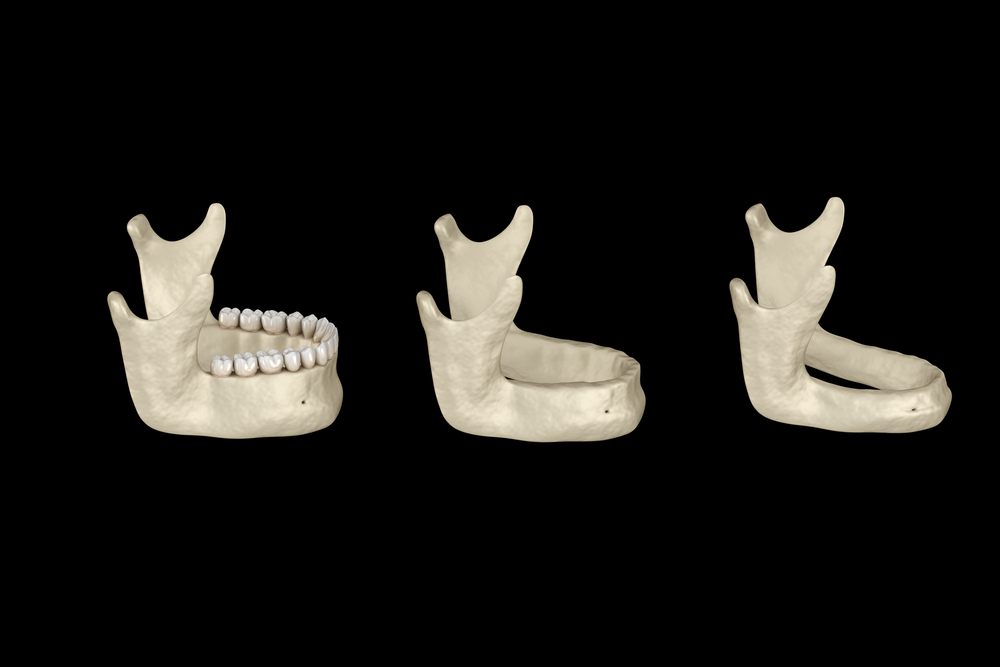
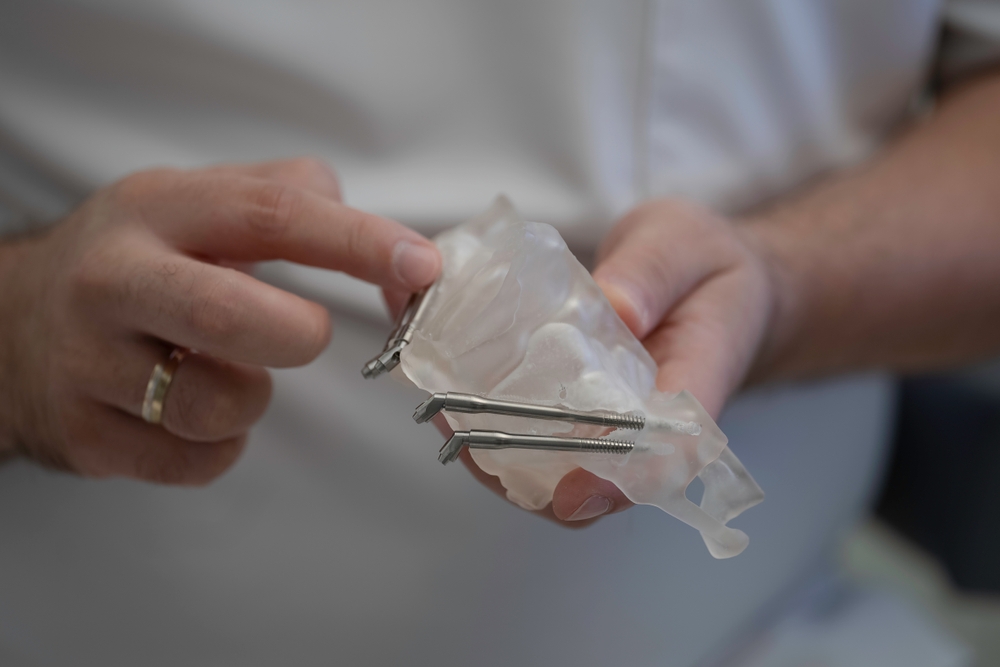
The health of your jawbone hinges on stimulation from tooth roots during chewing. Without this stimulation, bone deterioration or resorption can set in following tooth loss unless prompt replacement occurs.
Such bone loss carries both immediate and long-term repercussions, potentially leading to further tooth loss in a chain reaction. Facial features may appear sunken, contributing to an aged appearance.
Bone grafting is a surgical procedure used to replace missing bone and stimulate new bone growth. It’s a common solution for patients with bone loss ranging from minimal to severe. By transplanting bone tissue from the patient’s body or a donor to the affected area, bone grafting helps promote bone regeneration and provides structural support for dental implants or other treatments. This procedure enhances bone density and volume, making it an effective solution for patients with varying degrees of bone loss.
Zygomatic dental implants are an innovative solution for patients with severe bone loss in the upper jaw who may not have sufficient bone density to support traditional dental implants. Unlike conventional implants that require a certain amount of healthy bone, zygomatic implants are anchored in the zygomatic bone (cheekbone) or the dense bone near the sinus cavity. This technique allows patients with significant bone loss to receive stable and durable dental restorations without extensive bone grafting procedures.
Cysts and tumors of the face or jaw are abnormal growths or lesions that can lead to gradual destruction of the bone, weakening of the jaw, displacement of teeth, and potential pain and swelling. While most cysts and tumors are benign, they can invade surrounding tissues, leading to bony destruction and displacement of teeth.
Advanced imaging techniques such as panoramic radiographs and cone beam CT scans help Dr. Boltchi and the team at DFW Implant Center accurately visualize tumors and cysts in the face and jaw. These imaging methods play a crucial role in diagnosing these conditions effectively.
Additionally, biopsy procedures can help us obtain tissue samples for a definitive diagnosis, aiding in the development of a targeted treatment plan.
In-office surgeries conducted by Dr. Boltchi are a key component of the treatment approach for tumors and cysts of the face and jaw. These surgical interventions are designed to remove tumors or cysts, addressing the underlying issue directly within a controlled clinical setting. Out-of-office medical therapies may be prescribed to patients as part of their comprehensive treatment plan, offering additional support in managing these conditions.
Dental implants play a vital role in restoring oral function and aesthetics for individuals who have lost teeth due to cancer or cysts affecting the face and jaw. By replacing missing teeth with dental implants, patients can regain their ability to chew, speak, and smile confidently.
Bone graft procedures at DFW Implant Center restore jaw bone density that may have been lost as a result of oral cancer, tooth loss, or cysts. These grafting techniques help rebuild the jaw structure, providing stability and support for dental implants and oral health.

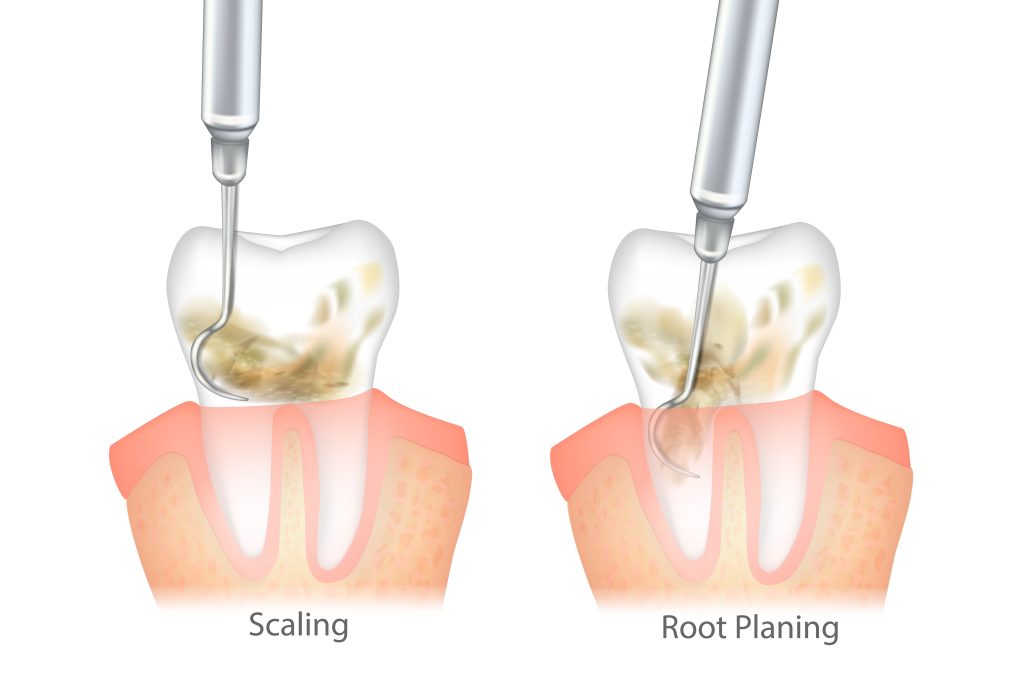
Gum disease, also known as periodontal disease, is an infection of the tissues, that surround and support the teeth. It is often caused by poor oral hygiene leading to plaque buildup. Symptoms of periodontal diseases include swollen, red, or bleeding gums, bad breath, and loose teeth. If left untreated, gum disease can lead to tooth loss and other serious health problems.
LANAP™ (Laser-Assisted New Attachment Procedure) and LAPIP™ (Laser-Assisted Peri-Implantitis Protocol) are advanced laser treatments for gum disease. They involve using a laser to target and remove infected tissue, bacteria, and calculus (tartar) from the gums and around dental implants. The laser energy also stimulates the regeneration of healthy gum tissue and bone, promoting the formation of new attachments between the gums and teeth, or around implants, to restore periodontal health.
Osseous surgery, also known as flap surgery, is a surgical treatment for advanced gum disease. It involves accessing the roots of the teeth by lifting the gums to remove tartar and diseased tissue. The underlying bone may also be reshaped to eliminate irregular surfaces where bacteria can accumulate, promoting better attachment of healthy gum tissue to the healthy teeth themselves and supporting structures.
A Gingivectomy is a surgical procedure used to remove excess gum tissue. It is often performed to eliminate pockets where bacteria can accumulate and cause gum disease. During the procedure, the dentist or periodontist carefully removes the overgrown gum tissue, reshaping the gums to achieve a healthier and more aesthetically pleasing gumline, which can facilitate easier oral hygiene practices.
Periodontal maintenance is an ongoing treatment plan designed to manage gum disease and prevent its progression. It typically involves regular professional cleanings (scaling and root planing) to remove plaque, tartar, and bacteria from below the gumline. Additionally, Dr. Boltchi and our team will provide guidance on proper oral hygiene techniques and monitor the condition of the gums to catch any signs of disease recurrence early on, ensuring long-term oral health.
Tongue tie, or ankyloglossia, is a condition where the strip of skin beneath the tongue is shorter than usual, restricting tongue movement. A lip tie occurs when the piece of skin connecting the upper lip to the upper gum (labial frenulum) is too thick or tight. Both conditions can affect breastfeeding in infants and lead to speech difficulties and oral health issues in adults.
A frenectomy is a simple surgical procedure used to treat tongue tie (ankyloglossia) and lip tie by releasing the tight band of tissue (frenulum) that restricts movement. Dr. Boltchi will carefully cut or remove the frenulum to allow for improved mobility of the tongue or lip. This can help alleviate issues such as difficulty with breastfeeding, speech impediments, and oral hygiene problems associated with tongue or lip tie. A frenectomy is typically a quick and minimally invasive procedure, with a relatively short recovery time and minimal discomfort for the patient.
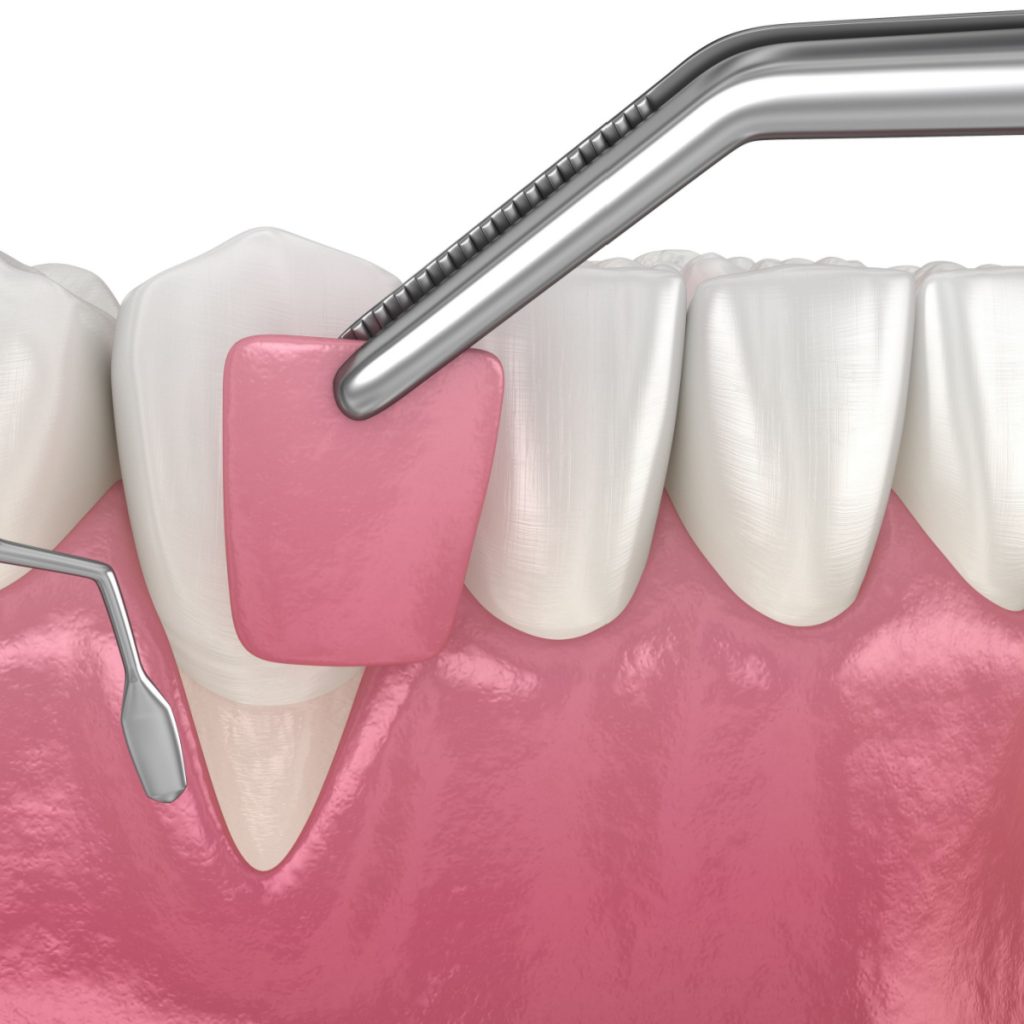
Gum recession involves the gums pulling back from the teeth, exposing more of the tooth’s root. It can be caused by factors like aggressive brushing, periodontal disease, or genetics. Common symptoms include tooth sensitivity and an elongated appearance of teeth and gums.
Gum grafting is a surgical procedure used to treat gum recession by restoring lost gum tissue and covering exposed tooth roots. During the procedure, tissue is taken from another part of the mouth, such as the palate, or sometimes from a donor source, and attached to the receded gums. This new tissue helps to strengthen and thicken the gums, protecting the tooth roots from sensitivity, decay, and further recession. Gum grafting can improve the appearance of the gums, reduce tooth sensitivity, and enhance overall oral health.
The recovery time for oral surgery varies depending on the procedure. Generally, patients can expect a few days to a couple of weeks for healing. Following post-operative care instructions, such as rest, proper oral hygiene, and avoiding strenuous activities, can help expedite the recovery process.
If you have a dental problem that your practice cannot treat, they will most likely refer you to a specialist or another professional who can provide the necessary dental care elsewhere. Dental professionals will prioritize ensuring their patients get the necessary oral health care services and will ensure you receive the appropriate treatment and support to address your specific, oral health care needs.
In cases where bone loss is too severe for grafting, alternative treatment options may be explored, such as zygomatic dental implants or other advanced surgical techniques. However, the effectiveness depends on individual factors, including the extent of bone loss and overall oral health. Your experienced periodontal team will assess your condition and recommend the most suitable treatment plan.
Whether oral surgery is covered by dental insurance depends on your specific insurance plan and the nature of the procedure. Some insurance plans may cover certain oral surgeries, such as tooth extractions or wisdom tooth removal, while others may require pre-authorization or have limitations on coverage. Check with your insurance provider to understand your coverage options.
Discover unparalleled oral health care at DFW Implant Center, where Dr. Boltchi and our skilled team specialize in a diverse range of dental treatments in Arlington, TX. Whether you’re facing impacted teeth or intricate facial and jaw cysts, our cutting-edge solutions are tailored to meet your unique needs.
Reach out today by dialing 817-663-4704 if you’re a new patient or 817-467-7731 if you’re a current patient, and schedule your consultation at DFW Implant Center. We’re proud to serve patients from Arlington and surrounding areas such as surrounding areas such as Irving, Fort Worth, and Grapevine, TX. Your smile deserves nothing but the finest care available, and DFW Implant Center is here to provide it.
I understand the information disclosed in this form may be subject to re-disclosure and may no longer be protected by HIPAA privacy regulations and the HITECH Act.

800 West Arbrook Blvd
Suite 360 Arlington, TX 76015